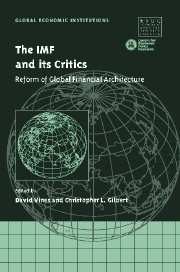Book contents
- Frontmatter
- Contents
- List of figures
- List of tables
- List of contributors
- Acknowledgements
- Introduction
- 1 The IMF and international financial architecture: solvency and liquidity
- 2 Progress towards greater international financial stability
- 3 International coordination of macroeconomic policies: still alive in the new millennium?
- 4 The Report of the International Financial Institution Advisory Commission: comments on the critics
- 5 Reforming the global financial architecture: just tinkering around the edges?
- 6 The IMF and capital account liberalisation
- 7 How should the IMF view capital controls?
- 8 The resolution of international financial crises: an alternative framework
- 9 Whose programme is it? Policy ownership and conditional lending
- 10 The IMF and East Asia: a changing regional financial architecture
- 11 The role of the IMF in developing countries
- 12 Argentina and the Fund: anatomy of a policy failure
- 13 Countries in payments' difficulties: what can the IMF do?
- 14 Accountability, governance and the reform of the IMF
- 15 The IMF at the start of the twenty-first century: what has been learned? On which values can we establish a humanised globalisation?
- Index
- References
Introduction
Published online by Cambridge University Press: 04 December 2009
- Frontmatter
- Contents
- List of figures
- List of tables
- List of contributors
- Acknowledgements
- Introduction
- 1 The IMF and international financial architecture: solvency and liquidity
- 2 Progress towards greater international financial stability
- 3 International coordination of macroeconomic policies: still alive in the new millennium?
- 4 The Report of the International Financial Institution Advisory Commission: comments on the critics
- 5 Reforming the global financial architecture: just tinkering around the edges?
- 6 The IMF and capital account liberalisation
- 7 How should the IMF view capital controls?
- 8 The resolution of international financial crises: an alternative framework
- 9 Whose programme is it? Policy ownership and conditional lending
- 10 The IMF and East Asia: a changing regional financial architecture
- 11 The role of the IMF in developing countries
- 12 Argentina and the Fund: anatomy of a policy failure
- 13 Countries in payments' difficulties: what can the IMF do?
- 14 Accountability, governance and the reform of the IMF
- 15 The IMF at the start of the twenty-first century: what has been learned? On which values can we establish a humanised globalisation?
- Index
- References
Summary
In 1994, the UK Economic and Social Research Council (ESRC) launched the Global Economic Institutions (GEI) Research Programme, with the objective of funding academic research on the functioning of multilateral economic organisations and about the global institutions within which economic activity takes place. The IMF and the World Bank are the two major global institutions established at the 1944 Bretton Woods Conference, and they have now been joined by the World Trade Organization (WTO). An earlier volume (Gilbert and Vines, 2000) arising out of the GEI Programme was devoted to the World Bank. In this volume, which will be the final publication from the programme, which ended in 2000, we move to the IMF.
This book began with a conference on the future of the Global Economic Institutions, held at the Bank of England, in May 2000 at which a number of the papers included as chapters in this volume were presented. We are very grateful to the Bank of England for hosting the conference. The conference discussion suggested to us that it would be valuable to bring together some of the presenters of papers at that conference and others to produce a book on the future of the IMF within international financial architecture.
The process of assembling the book has been overtaken by the crisis in Argentina. This crisis has hardened attitudes about the IMF, in that all wish to avoid repeat events like the Argentine crisis.
- Type
- Chapter
- Information
- The IMF and its CriticsReform of Global Financial Architecture, pp. 1 - 7Publisher: Cambridge University PressPrint publication year: 2004



